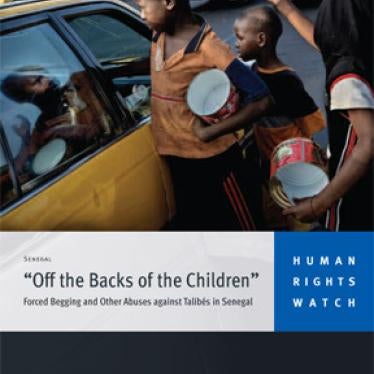(Dakar) - Guinea-Bissau's National Assembly should act quickly to pass a law criminalizing human trafficking, Human Rights Watch, SOS Talibé Children, and the Association of the Friends of Children said today. The draft law, which the Assembly recently placed on its agenda for its October-November session, would empower police, judicial officials, and civil society to improve protection of the country's children, thousands of whom are trafficked from Guinea-Bissau to Senegal and other countries each year.
Guinea-Bissau, a West African country of 1.5 million people, currently has no law against human trafficking. Child trafficking is a serious problem, which appears to be growing in Guinea-Bissau, where thousands of children are moved each year both internally and across borders for the purpose of exploitation, including for agricultural labor and forced begging.
"This important piece of legislation is the first step to combat the serious problem of child trafficking from Guinea-Bissau," said Corinne Dufka, senior West Africa researcher at Human Rights Watch. "Guinea-Bissau's National Assembly would finally send the right signal to human traffickers that the country intends to protect its children."
The draft law would harmonize domestic law with the country's international obligations, including the United Nations Protocol to Prevent, Suppress and Punish Trafficking in Persons, which Guinea-Bissau ratified in 2007. Past attempts to place the current draft law on the National Assembly's agenda - and pass it into law - have repeatedly stalled.
SOS Talibé Children (SOS Crianças Talibés) and the Association of the Friends of Children (Associação dos Amigos da Criança) are both Guinea-Bissau-based child-assistance organizations with operations across the country. They have worked to ensure passage of the anti-trafficking law.
Human Rights Watch documented in an April 2010 report how each year thousands of boys are brought north from Guinea-Bissau to Senegal by their teachers or an intermediary, purportedly to study in daaras, or residential Quranic schools. Some boys described to Human Rights Watch being taken by clandestine routes between border villages at night, sometimes on foot, to evade detection.
Once in Senegal, most are forced to beg and suffer conditions akin to slavery by their Quranic teachers in the daaras. Many of these boys suffer severe physical and psychological abuse for failing to meet daily quotas of money, rice, and sugar demanded by their teachers. They also suffer from severe malnutrition and frequently from disease as a result of long hours on the street, abysmal conditions in the daara, and a lack of medical care.
Many of these cases clearly meet the international definition of trafficking, the organizations said. Trafficking between Guinea-Bissau and neighboring countries may also occur under other circumstances, including taking children to work in cotton or cashew fields, and transporting women to be forced into sexual exploitation.
The organizations have interviewed police and border officials working to improve anti-trafficking efforts and have assisted in training for border officials and forming community groups to monitor clandestine border crossings involving children.
Those working to stem trafficking suffer from a crippling lack of resources. In each of the two main border regions in eastern Guinea-Bissau, police and border officials have only one car and one motorbike to monitor a combined 250-kilometer stretch of border with Senegal and Guinea-Conakry.
"Improved training and resources for border officials could help reduce the flow of children at risk of being taken across the border, and we need that," said Malam Baio, director of Bafatá-based SOS Talibé Children. "But passing this law is essential. The lack of a domestic legal framework to address trafficking prevents officials from tackling the root problem."
At present, traffickers from Guinea-Bissau face minimal consequences, if any. Even when suspects are stopped and lack the necessary documents for moving a child across the border, there are no laws that enable the government to charge or prosecute them effectively. Without fear of penalty, traffickers often make repeated attempts until they succeed, police officials and children have told the organizations. If the proposed law is passed, law enforcement and judicial authorities would at least be able to arrest, charge, and prosecute suspects for acts of trafficking.
Police officers, prosecutors, and children's rights advocates have told the groups that current laws that might apply to trafficking - the crimes of "abuse of confidence" or "harming the welfare of another" - are too vaguely worded to prosecute trafficking effectively.
A police commissioner in an eastern region of Guinea-Bissau from which many children are trafficked to Senegal described the problem to Human Rights Watch in June: "We can't do our jobs because there isn't a law against trafficking ...We can stop the movement of children across the border, but to charge the offender, it's impossible. It's also difficult to sensitize families, because we can't clearly point to a law against what is happening."
SOS Talibé Children and the Association of the Friends of Children indicated that the problem of trafficking continues to grow and that more children in particular are being forced into abusive or exploitation situations in Senegal and other neighboring countries every year.
"Well-intentioned law enforcement authorities trying to combat trafficking in Guinea-Bissau currently have their hands tied," said Fernando Cá of the Association of the Friends of Children. "Traffickers left at liberty to ply their ugly trade cannot be held accountable until this law is passed."







